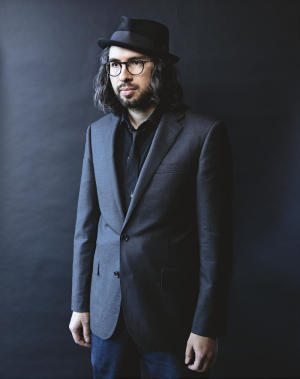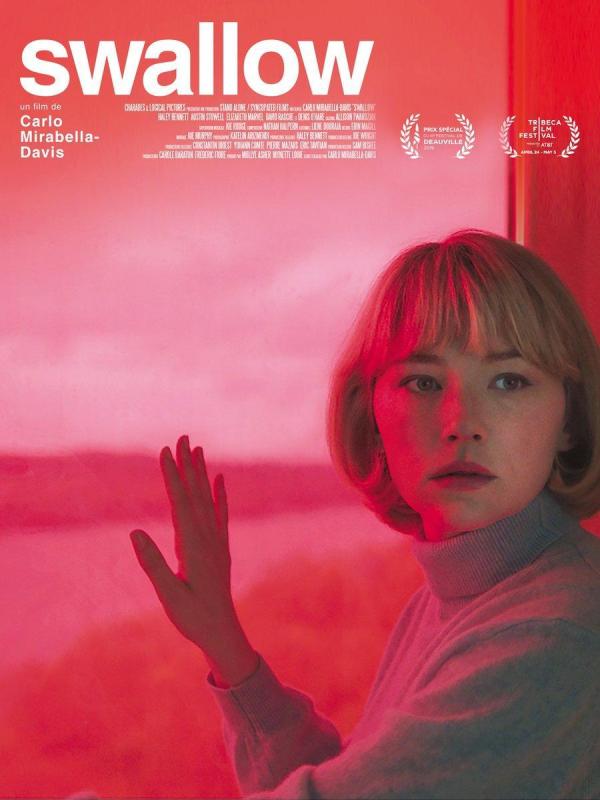![]() BY DAN TABOR FILM CRITIC A few weeks ago I got to chat with Carlo Mirabella-Davis, the writer and director of the unconventional psychological thriller Swallow, which opens in Philadelphia tomorrow. The upstate New York native’s feature length directorial debut stars Haley Bennett (The Girl on the Train) as the immaculate Hunter, a timid woman who married into a wealthy family and is now a stay at home wife. Desperately searching for the means to regain some semblance of control over her life, Hunter develops pica, a psychological disorder where you swallow things that no human should ingest: thumb tacks, dirt, nails, pebbles, soap, hair and so on. Because its narrative explores some disturbing subject matter,Swallow is hard to categorize, but at its very core is a story about one woman’s attempt to find herself and the dark places it takes her.
BY DAN TABOR FILM CRITIC A few weeks ago I got to chat with Carlo Mirabella-Davis, the writer and director of the unconventional psychological thriller Swallow, which opens in Philadelphia tomorrow. The upstate New York native’s feature length directorial debut stars Haley Bennett (The Girl on the Train) as the immaculate Hunter, a timid woman who married into a wealthy family and is now a stay at home wife. Desperately searching for the means to regain some semblance of control over her life, Hunter develops pica, a psychological disorder where you swallow things that no human should ingest: thumb tacks, dirt, nails, pebbles, soap, hair and so on. Because its narrative explores some disturbing subject matter,Swallow is hard to categorize, but at its very core is a story about one woman’s attempt to find herself and the dark places it takes her.
Carlo was very generous with his time, not only discussing the film’s very real-life inspirations, but how he worked with his cast and crew to craft a very feminist story that never cheapens itself with unwelcome detours into exploitation. I will say the less you know going into Swallow the better. But having seen the film three times now, I couldn’t wait to dig into what was easily one of the most deeply affecting films I’ve seen all year.
PHAWKER: You’ve said in previous interviews that this film was partially inspired by your grandmother who had her own control mechanisms. Why did you choose Pica and what drove you to make a film about it?
CARLO MIRABELLA-DAVIS: So, yeah, the film was inspired by my grandmother, who was a  homemaker in the 1960s, who developed various rituals of control. She was an obsessive hand washer, who would go through four cakes of soap a day and 12 bottles of rubbing alcohol a week. I think she was looking for order in a life she felt increasingly powerless and she was in an unhappy marriage. My grandfather at the behest of the doctors put her into a mental institution, where she was given electroshock therapy and a nonconsensual lobotomy.
homemaker in the 1960s, who developed various rituals of control. She was an obsessive hand washer, who would go through four cakes of soap a day and 12 bottles of rubbing alcohol a week. I think she was looking for order in a life she felt increasingly powerless and she was in an unhappy marriage. My grandfather at the behest of the doctors put her into a mental institution, where she was given electroshock therapy and a nonconsensual lobotomy.
I always felt like she was being punished in a way for not living up to society’s expectations of what they felt the wife or a mother should be, and for being different. So, I wanted to make a film about that. But hand-washing is not very cinematic, you know? So, I remember seeing an image of all the contents of someone’s stomach who had Pica, that had been surgically removed. They were fanned out on a table, like an archeological dig and I was so fascinated by what drew the patient to those artifacts. It almost seemed like a mystical experience or like a Holy communion and I wanted to know more. So, the marriage of those two concepts was how this all came about.
PHAWKER: That leads me right into my next question: how did you choose the objects Hunter swallows in the film? Because they’re almost like little trophies for her. How much thought went into choosing them?
CARLO MIRABELLA-DAVIS: Oh, a great deal of thought. I’m very, very, intrigued by the idea that every single aspect of making a movie, every department is an opportunity for storytelling. We wanted each object to be a different kind of emotional memory, if you will, to have an emotional texture. So, the marble for example, you know, there’s a kind of nostalgia to it and in the sound, you hear a little bit of like a beach scene. It connects to something almost kind of comforting and magical about it, whereas the thumbtack is a much more dangerous, experience and relationship. So, every single object has its own arc, and its own sound design. Hunter approaches each of the objects differently depending on where she is emotionally in the film and what triggers her Pica compulsion just before she decides to consume that object.
PHAWKER: That’s amazing. So how did you come to cast Haley Bennett? How collaborative was the process between you two, because she’s amazing on screen?
CARLO MIRABELLA-DAVIS: Oh, thank you for saying that. Yes, I think Haley delivers a tour de force performance and I was so incredibly fortunate that she decided to make this film. I had seen her in Girl On A Train and I thought she did an amazing job in that film and I felt that she might be interested in doing something, that was daring and unusual and I really wanted to see her in a lead role. So, I wrote her a passionate letter and hoped that she would agree to meet with me, and she did. We kind of instantly telepathically bonded about the character and she’s also an executive producer on the film, so she was a very, very generous with her time. We met a lot and discussed the character in intricate detail.
Haley is so good with layers of emotion. Hunter wears multiple masks throughout the film. There’s that first mask, which is like the reflection of normalcy, the placid smile, reflecting what her husband wants her to be. Then there’s the second mask, which is like her pain, her doubts — “Is where I belong? Is this who I am?” Then there’s the third mask, which is like her true self, her primal self, you know, threatening to emerge. Haley can give you all of those emotional, psychological layers with just the twitch of her eye or the touch of her hair.
PHAWKER: Yeah, I love her little mannerisms like the hair touching. I didn’t catch that the first time, but the second time I saw that little ritual start to crop up over and over.
CARLO MIRABELLA-DAVIS: That was all Haley. I remember the first time she did it on set, it was our first shot. She did it and just like the moment it happened, the character just sort of came to life in this amazing way.
PHAWKER: Given you’re a male filmmaker, I have to say the film manages to steer clear of the male gaze and never falls into the more exploitive trappings you’d probably expect. That had to be a conscious decision on your part and what went into making sure you never fell down that path?
CARLO MIRABELLA-DAVIS: My producers and I, the incredible Molly Asher and Mynette Louie, we had a lot of discussions about how to avoid my male gaze affecting the story and how to keep the movie authentic. Luckily, two thirds of our cast and all of our department heads were women and I was very fortunate that so many amazing female artists and collaborators decided to make my grandmother’s story their own. We very much consider the film a feminist movie.
I also come from a kind of unconventional background. I was raised in a family of feminists and of course my grandmother’s story was very prominent in my mind. In my twenties, for about five years, I identified as a woman, wore women’s clothing and I had a different name and it was a really wonderful and pivotal time in my life. It was a beautiful and extremely creative time and it was also a real eye-opener. Because if you’re raised as a man, you don’t always see how baked into the cake of society sexism is. Just walking down the street, seeing how people, view female identified people and constantly trying to control female identified people. It really solidified my feminist beliefs and made me want to make a film about that. But, I’ve lived most of my life as a man, so my male gaze was still something that I was quite worried about and I’m glad that I had so many amazing collaborators to keep the film authentic.
grandmother’s story was very prominent in my mind. In my twenties, for about five years, I identified as a woman, wore women’s clothing and I had a different name and it was a really wonderful and pivotal time in my life. It was a beautiful and extremely creative time and it was also a real eye-opener. Because if you’re raised as a man, you don’t always see how baked into the cake of society sexism is. Just walking down the street, seeing how people, view female identified people and constantly trying to control female identified people. It really solidified my feminist beliefs and made me want to make a film about that. But, I’ve lived most of my life as a man, so my male gaze was still something that I was quite worried about and I’m glad that I had so many amazing collaborators to keep the film authentic.
PHAWKER: I want to dig a little bit deeper into the film. The second half, when you deal with Hunter’s eventual identity crisis. Where did this piece of the story come from and what kind of research did you do for this?
CARLO MIRABELLA-DAVIS: I don’t want to talk too much about the ending, because I don’t want to get too much into spoiler territory. I’ll speak generally, I did a lot of research into a lot of different areas. We worked with the world expert on Pica Dr. Rachel Bryant-Waugh, who actually wrote a case study of Hunter based on the script as if she was a patient. It’s a very important document for us. I was very moved by #metoo movement, which I think is a really important catalyst for change in our society. I think that a lot of what happens psychologically is that, if you’ve been through a traumatic experience, if you’ve been through a trauma of that kind, society I think spends a lot of time heaping blame onto the victims.
There’s that sense of culpability, that society puts on people and makes the victim feel ashamed. So, I wanted to examine the unfortunate aspect of how that can happen, because what happened has nothing to do with Hunter. But yet I think that there is that lingering effect that society unfortunately reinforces, especially in a patriarchal world where men are given carte blanche to do horrifying things and everyone turns a blind eye. That was sort of the impetus to explore those issues.
PHAWKER: I love the metaphors you have underpinning this narrative of people of wealth in and power trying to control the female body. It’s gut wrenching to watch because the deeper Hunter falls, the less she’s treated like a human being and the more like a broodmare. Abortion isn’t an easy topic to deal with and this film sort of propels you through it.
CARLO MIRABELLA-DAVIS: I don’t want to talk too much about the ultimate conclusion of the film, but I will say that the movie is very much about Hunter reclaiming her control over her body. And she does realize at a certain point that the family is using her like a vessel and that her husband sees her as nothing more than one of the many objects that she swallows. You know, sort of around the house augmenting his life. One of the opening scenes is kind of a celebration, to celebrate the husband and his accomplishments. She’s kind of thanked, but she’s thanked in a way that’s about supporting and augmenting him and his narrative. So, I very much liked the idea that Hunter would start to realize, “Oh my God, every aspect of my life has been chosen by these people and I’m in a kind of a glass display case.”
Even though the compulsion is dangerous, it allows her to discover her true self and reclaim who she really is and what she really wants, and to reclaim her body. Also the film examines the idea of that realization when she discovers that she’s pregnant, that maybe she doesn’t want to be a mother. That feeling goes back to that idea of her thinking, “Well, everyone wants me to be this person, she thinks I should want this, so I’m just going to repress my misgivings.” Of course when you do that, it comes out in other ways and it comes out in the form of her compulsion. Because of her conscious mind, she’s thinking, I’m happy, this is wonderful, this is what I want, but our unconscious mind, it’s a different story.
PHAWKER: Finally, what’s next for you?
CARLO MIRABELLA-DAVIS: I am in the midst of working on a number of projects, including a feminist supernatural horror movie. I love Dario Argento’s movies such, especially Suspiria, and I love films that examine these kinds of issues through the lense of genre. So, I’m, I’m working on that and I’m working on a couple of other projects.
I’m interested in the television space as well. I just want to keep telling stories that I’m passionate about and hopefully stories that make people feel seen and fight back against controlling power structures. I hope to keep working with amazing collaborators and keep making movies. I used to watch five films a day. I’m utterly obsessed with film, I’m enthralled with it, so I hope I can continue doing it.

